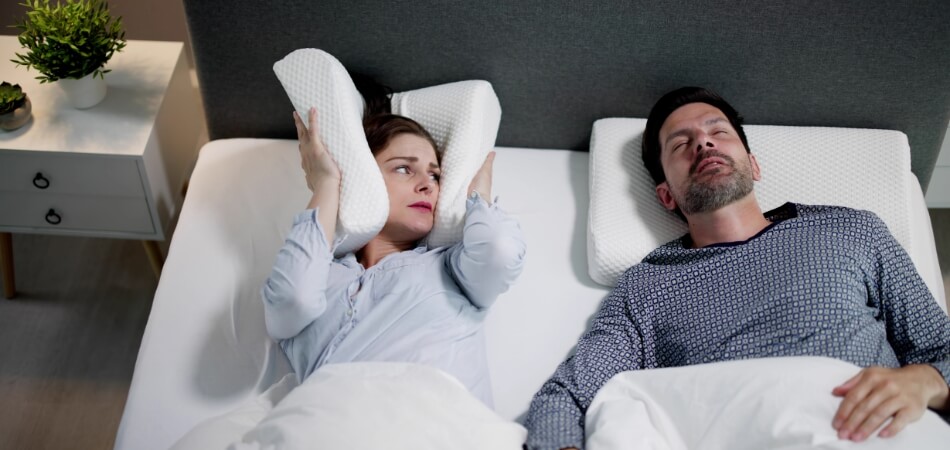Imagine a peaceful night, the world enveloped in silence, and you drift off into the embrace of sleep. In this serene moment, a question gently emerges in your mind: “can you actually hear yourself snore?” This query dive into the puzzling relationship between our sleep and the sounds we create.
Technically, yes, you can hear your own snoring, just like you can hear the world around you. But here's the catch: during deep sleep, your brain becomes less sensitive to sounds, including your own nocturnal noises.
In this blog, we'll dive into the mystery of snoring. We'll explore why it happens, whether you can hear yourself snoring, and share tips for a better night's sleep, whether you're the snorer or the listener. Let's begin our journey into the world of nighttime sounds.
The Science of Snoring
Snoring, a common nocturnal phenomenon, results from relaxed throat muscles and partially blocked airways. It's often linked to obesity and sleeping on one's back. These factors cause vibrations in the soft palate and uvula, creating the familiar snoring sound.

Understanding snoring requires a grasp of its anatomical triggers. Excess weight can lead to the narrowing of air passages, while sleeping on your back encourages the tongue and soft palate to collapse backward, obstructing airflow. These physical changes during sleep contribute to the mechanics of snoring.
There are different types of snoring, with primary snoring being the mildest form, characterized by snoring sounds without sleep apnea. On the other end of the spectrum, complex snoring patterns are often accompanied by sleep apnea, where breathing temporarily stops during sleep due to complete airway blockage. Understanding these distinctions in the science of snoring is crucial for effective treatment and improving the quality of sleep.
Different Types of Snoring
Snoring isn't a one-size-fits-all issue; it comes in various forms, each with its unique characteristics and underlying causes. Understanding these different types of snoring is essential for pinpointing effective solutions and improving sleep quality.
Primary Snoring (Simple Snoring):
Primary snoring is the mildest form, typically characterized by the rhythmic sound of snoring without significant sleep disruption. It's often related to temporary obstructions in the airway and may not be a sign of a more serious condition.
Obstructive Sleep Apnea (OSA):
OSA is a more severe form of snoring. It involves repeated episodes of complete or partial blockage of the upper airway during sleep, leading to disrupted breathing, loud snoring, and potential health risks.
Positional Snoring:
Some individuals only snore when they sleep in specific positions, usually on their back. This is known as positional snoring, and changing sleep posture can alleviate it, offering a simple solution.
Nasal Snoring (Rhinitis-Related Snoring):
Nasal snoring occurs when there are obstructions or congestion in the nasal passages. It often results in snoring sounds that seem to come from the nose rather than the throat, and it can be due to allergies or nasal structural issues.
Mouth Snoring (Oral Snoring):
Mouth snoring is associated with breathing through the mouth during sleep. It may be due to nasal congestion, a natural tendency to sleep with an open mouth, or issues with the soft palate.
Complex Snoring Patterns (Mixed Snoring):
Complex snoring patterns involve a combination of the aforementioned types. It can be accompanied by sleep apnea and requires a thorough evaluation by a healthcare professional for appropriate management and treatment.
Identifying the kind of snoring you or your partner has is the initial step in finding helpful solutions. Whether it's a basic positional problem, a stuffy nose, or something more complex like sleep apnea, matching fixes to your snoring type can mean better sleep and better health.
Can you hear yourself snore?
Think of a tranquil night, the world wrapped in silence, and you in the embrace of sleep. Then comes the question: Can you hear yourself snore? During deep sleep, your brain is less responsive to sounds, including your snoring.

Snoring, a common nighttime occurrence, may seem loud to anyone else in the room, but the truth is, it might not be as audible to you. This phenomenon stems from the science of sleep and sound perception. As you slip into the depths of slumber, your brain's sensitivity to external noises diminishes, allowing you to remain blissfully unaware of your own snores.
So, technically when you hear snoring, especially during the lightest stages of sleep, you're more likely to be unconscious of your nocturnal symphony during deep, restorative sleep. This fascinating aspect of our sleep physiology highlights the complexity of our nocturnal experience and the wonder of the human brain. Understanding this phenomenon can lead to a more peaceful night for both snorers and their sleeping partners.
How to Counteract Snoring?
If snoring keeps you or your loved ones up at night, you're not alone. The good news is that there are effective ways to counteract snoring and enjoy more restful sleep. Here's a step-by-step guide to help you address this common sleep issue.
Step 1: Identify the Cause:
The first step in countering snoring is to pinpoint its cause. Snoring can result from various factors like sleep position, obesity, or nasal congestion. Understanding the root cause will guide your approach to finding the right solution.
Step 2: Lifestyle Changes:
If excess weight contributes to your snoring, consider adopting a healthier lifestyle. Regular exercise and a balanced diet can help reduce snoring for some individuals. Additionally, avoid alcohol and sedatives before bedtime, as they relax throat muscles and worsen snoring.
Step 3: Adjust Sleep Position:
Sleeping on your back often leads to snoring due to the relaxation of throat muscles and the potential obstruction of the airway. Try sleeping on your side to keep airways open. You can use body pillows or position alarms designed to encourage side-sleeping.
Step 4: Nasal Congestion Relief:
If nasal congestion is the culprit, address it with remedies like saline nasal sprays, a humidifier in your bedroom, or over-the-counter decongestants. Ensuring clear nasal passages can significantly reduce snoring.
Step 5: Anti-Snoring Devices:
Several devices, including nasal strips, nasal dilators, and anti-snoring mouthpieces like ZQuiet, aid in reducing snoring by maintaining open airways and enhancing airflow. Seek advice from a healthcare professional or dentist to determine the device best suited to your needs.
Step 6: Consult a Healthcare Professional:
If snoring persists despite lifestyle changes and home remedies, consult a healthcare professional. They can assess your snoring and recommend treatments, including Continuous Positive Airway Pressure (CPAP) therapy for sleep apnea.
Step 7: Surgery (As a Last Resort):
In severe cases, surgical options like uvulopalatopharyngoplasty (UPPP) or genioglossus advancement (GA) may be considered. These should only be pursued after consultation with a medical specialist.
By following these steps and tailoring your approach to the specific cause of your snoring, you can effectively counteract snoring and enjoy more peaceful nights of sleep. Remember that persistence and patience are key, and consulting a healthcare professional when needed can lead to the most suitable solution.
Tips for a Peaceful Night's Sleep
Achieving a peaceful night's sleep is essential for your physical health and mental well-being. In today's fast-paced world, quality rest can sometimes elude us. In this guide, we will explore practical tips and strategies to ensure you enjoy a tranquil night's sleep.

- Establish a Consistent Sleep Schedule: To regulate your body's internal clock, set a regular bedtime and wake-up time, even on weekends. This consistency can help improve the overall quality of your sleep.
- Optimize Your Sleep Environment: Transform your bedroom into a serene oasis by keeping it dark, quiet, and at a comfortable temperature. Investing in a supportive mattress and pillows can further enhance your sleep environment.
- Limit Screen Exposure: The prevalence of screens in our lives can disrupt our sleep patterns. Reduce screen time before bed, as the blue light emitted by devices can interfere with the production of melatonin, a hormone that regulates sleep.
- Mindful Eating Habits: Pay attention to your dietary choices in the hours leading up to bedtime. Avoid heavy meals, caffeine, and alcohol, as they can disrupt the quality of your sleep and lead to nighttime awakenings.
- Stay Active but Not Too Late: Regular physical activity is essential for overall health, but avoid vigorous workouts close to bedtime. Exercise energizes the body, making it harder to wind down and prepare for sleep.
- Embrace Relaxation Techniques: Incorporate relaxation practices into your evening routine. Techniques such as deep breathing, meditation, or gentle stretching can calm your mind and prepare your body for sleep.
- Keep Naps Short and Sweet: If you need to nap during the day, limit your naps to 20-30 minutes. Longer naps can disrupt your sleep-wake cycle and lead to grogginess upon waking.
- Watch Liquid Intake: Be mindful of your liquid consumption in the evening. Minimize drinking close to bedtime to reduce the likelihood of waking up in the middle of the night to use the bathroom.
- Stress Management: Stress and anxiety are common disruptors of sleep. Consider learning stress-reduction strategies or seeking counseling to manage these issues effectively.
- Seek Professional Guidance: If sleep problems persist despite your efforts, it's essential to consult a healthcare provider or sleep specialist. They can conduct a thorough evaluation and provide tailored guidance to address your specific sleep challenges.
By integrating these tips into your daily routine and creating an optimal sleep environment, you can greatly enhance your chances of enjoying a peaceful night's sleep and waking up feeling refreshed and revitalized.
Conclusion
Exploring snoring has revealed the connection between sleep and sound. We've learned that snoring often happens when throat muscles relax and airways get partially blocked. We've also discovered various snoring types, each with its own causes and solutions.
The original question, “Can you hear yourself snore?” has a fascinating answer. Yes, you can technically hear your own snoring, just like you can hear other sounds. But when you're in deep sleep, your brain becomes less sensitive to noise, including your own snores.
As you strive for improved sleep, keep in mind that knowing your snoring type and tackling its root issues can result in more serene nights and enhanced well-being. While the science of sleep confirms that you can hear yourself snore, the ultimate goal is achieving restful and refreshing nights.






